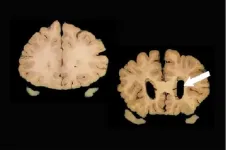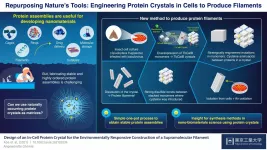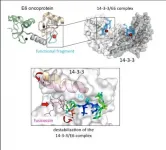INFORMATION:
'Unmet health care need and income-related horizontal equity in use of health care during the COVID-19 pandemic' is published in Health Economics. The paper is co-authored by Dr Apostolos Davillas (UEA) and Prof Andrew M. Jones (University of York).
How COVID-19 impacted UK healthcare
Peer reviewed - survey - people
2021-04-26
(Press-News.org) Just one third of people in the UK managed to access the hospital care they needed at the peak of the first wave of the Covid-19 pandemic - according to new research from the University of East Anglia.
A new study published today looks at the extent to which people managed to access NHS healthcare in April 2020, and as lockdown restrictions eased.
The researchers found that, despite high levels of unmet need, there was equal access to NHS hospital care for people at different levels of income. And the NHS principle of equal treatment for equal need was upheld.
However, people on higher incomes had better access to GP consultations, prescriptions and medical helplines at the peak of the first wave.
Dr Apostolos Davillas, from UEA's Norwich Medical School, said: "A founding principle and duty of the NHS is to ensure equal access for equal need irrespective of age, location or ability to pay.
"When the Covid-19 pandemic hit, the UK reallocated resources within the health and social care systems to handle coronavirus cases. NHS trusts redesigned their services to release capacity for Covid-19 patients by discharging thousands to free up beds and postponing planned treatments.
"This affected their ability to meet health care need due to other health conditions, illnesses or health emergencies.
"We wanted to find out whether people in the UK were able to use the healthcare services they needed during the first wave of the Covid-19 pandemic, through lockdown and beyond."
The researchers studied data from the UK Household Longitudinal Study (UKHLS), which launched a Covid-19 survey to examine the impact of the coronavirus pandemic.
The study included a sample of 6,598 participants who reported that they had a health care need, and the researchers estimated their healthcare use as the pandemic unfolded between April and July 2020 - to work out the 'unmet need' for healthcare. The study also looked at whether people's long-run income affected access to healthcare.
They found that unmet need was highest for both inpatient and outpatient hospital care shortly after the introduction of the first lockdown on March 23. Levels of unmet need were lower for non-emergency medical helplines and GP consultations, while much lower levels of unmet need were evident for community pharmacist advice, over the counter medications and use of prescription medicines.
Dr Davillas said: "Our study shows that there was a more pronounced impact on secondary care versus primary care services during the peak of the first wave. For example, in late March and April only 33 per cent of those who needed inpatient care managed to use those services, however, 98 per cent of respondents reported that they got their prescription medicines.
"Unmet need became less evident from May through to July 2020. For example, outpatient consultations increased from 47 per cent in April to 63 percent in June, following the easing of lockdown. About 70 per cent of those who needed outpatient care had access to it in July, after the complete easing of the first lockdown on July 4.
"When it comes to the relationship between people's use of healthcare and their income, we found that despite high levels of unmet need, people of all incomes had equal access to the hospital care that was provided. But we found that more well-off people had better access to GP consultations, prescriptions and medical helplines at the peak of the first wave.
"In a publicly funded health care system, pro-rich inequity in health care use may be because people on lower low-incomes are heavily time-constrained, due to harsher employment and living arrangements, and may be less able to seek the health care they need. But we found that this inequality was reduced as the pandemic progressed.
"However, we found persistent pro-rich inequities for services that may be related to people's ability to pay, such as over the counter medications and advice from community pharmacists," he added.
ELSE PRESS RELEASES FROM THIS DATE:
Smell training, not steroids, best treatment for COVID-19 smell loss
2021-04-26
Steroids should not be used to treat smell loss caused by Covid-19 according to an international group of smell experts, including Prof Carl Philpott from the University of East Anglia.
Smell loss is a prominent symptom of Covid-19, and the pandemic is leaving many people with long-term smell loss.
But a new study published today shows that corticosteroids - a class of drug that lowers inflammation in the body - are not recommended to treat smell loss due to Covid-19.
Instead, the team recommend 'smell training' - a process that involves sniffing at least four different odours twice a day for several months.
Smell loss expert Prof Carl Philpott from UEA's Norwich Medical School, said: "The huge rise in smell loss caused by Covid-19 has created an unprecedented worldwide demand for ...
Mental health promotes children's physical activity during lockdown
2021-04-26
According to the Motorik-Modul-Längsschnittstudie (MoMo, Motor Module Longitudinal Study) of Karlsruhe Institute of Technology (KIT) and Karlsruhe University of Education (PHKA), mental health of children and adolescents decreased during the first lockdown. For children aged between 4 and 10 years and for girls irrespective of their age, mental health was found to promote physical activity during Covid-induced lockdown in spring 2020. This is reported in Children (DOI: 10.3390/children8020098).
"The impacts of the lockdown on children and adolescents is discussed widely," ...
Increase in stroke mortality in people with COVID-19 during first lockdown
2021-04-26
Deaths of people who suffered strokes increased during the first lockdown compared to the three previous years, new data analysis has found. Despite the pandemic, health care quality was maintained at a high level.
In their paper, published today in Stroke American Heart Association, research teams from King's College London, Guy's and St Thomas' NHS Foundation and the Sentinel Stroke National Audit Programme (SSNAP) analysed the data of 184,017 patients admitted to hospital with confirmed stroke during October-April periods across four consecutive years. This patient data were collected from 114 hospital trusts in England, Wales and Northern Ireland.
Starting from the third week of February 2020 there was ...
Study evaluates biomarker criteria for assessing Alzheimer's risk
2021-04-26
One of the biggest challenges in Alzheimer's research is to identify biomarkers that can identify people who are at risk of developing dementia. Biomarkers could be used to screen people so they might be helped before they develop dementia.
Researchers have focused primarily on three such biomarkers. Two are Alzheimer's-related proteins, amyloid and tau. Amyloid forms clumps in brains, and tau forms skeins of filaments called neurofibrillary tangles. Both can be detected in cerebral spinal fluid or by specialized positron emission tomography (PET) scans. The third marker, brain atrophy, can be seen with CT or MRI scans.
To guide researchers, the National Institute on Aging and the Alzheimer's Association ...
In-cell nano-3D printer: Synthesizing stable filaments from in-cell protein crystals
2021-04-26
Proteins are undoubtedly some of the most fascinating biomolecules, and they perform many of the functions that (in our eyes) separate life from inanimate matter. Multi-molecular protein assemblies even have large-scale structural functions, as evidenced by feathers, hair, and scales in animals. It should come as no surprise that, with progress in advanced nanotechnology and bioengineering, artificial protein assemblies have found applications in a variety of fields, including catalysis, molecular storage, and drug delivery systems.
However, producing ordered protein assemblies remains challenging. It is particularly difficult to get monomers, the building blocks of proteins, to assemble stably into the desired structures; this generally ...
Biophysicists found an Achilles heel of a cancerogenic virus
2021-04-26
Although most oncological diseases are not infectious, some viruses can cause cancer. According to the World Health Organization, two HPV subtypes account for 70% of cervical cancer cases and pre-existing conditions. Moreover, HPV considerably increases the risks of other types of cancer. Within an infected cell, a viral protein called E6 binds with human proteins from the 14-3-3 family. 14-3-3 proteins are present in cells of all eukaryotic organisms and can interact with hundreds of other important players of intracellular processes to regulate cell division, gene activity, metabolism, cell death, and intracellular ...
Researchers identify the proteins that cause intestinal disease
2021-04-26
Researchers from Tel Aviv University have created an artificial intelligence platform that can identify the specific proteins that allow bacteria to infect the intestines - a method that paves the way for the creation of smart drugs that will neutralize the proteins and prevent disease, without the use of antibiotics. Participating in the study, which was published in the prestigious journal Science, were Ph.D. student Naama Wagner and Prof. Tal Pupko, head of the Shmunis School of Biomedicine and Cancer Research at the Faculty of Life Sciences and the new Center for Artificial Intelligence ...
Researchers complete high-precision time-frequency dissemination
2021-04-26
Prof. PAN Jianwei and his colleagues from the University of Science and Technology of China of the Chinese Academy of Sciences investigated the high-loss free space high-precision time-frequency dissemination experiment between remote locations, simulating the high-precision time-frequency high-orbit satellite-ground links in the channel loss, atmospheric noise, and transmission delay effects.
This link experiment exhibits that the instability of the time-frequency transfer via a satellite in middle-high earth orbits might reach E-18 at 10,000 s, enabling ...
Football Fitness gives an important boost to health in women treated for breast cancer
2021-04-26
The University of Southern Denmark (SDU), Rigshospitalet and the University of Copenhagen have come together to study the effects of Football Fitness on various health parameters and self-rated health following treatment for breast cancer.
The results of the project, called Football Fitness After Breast Cancer (ABC), have now been published in three scientific articles published in international sports medicine, cardiology and oncology journals.
"The main conclusion is that Football Fitness is an intense and good form of training for women treated for breast cancer, with beneficial effects on balance, muscle strength and bone density," says END ...
Pain patients and healthcare providers want CDC opioid guideline revoked
2021-04-26
The CDC's opioid prescribing guideline has failed to reduce addiction and overdoses, significantly worsened the quality of pain care in the United States and should be revoked, according to a large new survey of patients and healthcare providers by Pain News Network, an independent, non-profit news organization.
Nearly 4,200 patients and providers participated in the online survey, which was conducted as the Centers for Disease Control and Prevention prepares to update and possibly expand its 2016 guideline, which discourages doctors from prescribing opioid ...
LAST 30 PRESS RELEASES:
Jeonbuk National University researchers explore metal oxide electrodes as a new frontier in electrochemical microplastic detection
Cannabis: What is the profile of adults at low risk of dependence?
Medical and materials innovations of two women engineers recognized by Sony and Nature
Blood test “clocks” predict when Alzheimer’s symptoms will start
Second pregnancy uniquely alters the female brain
Study shows low-field MRI is feasible for breast screening
Nanodevice produces continuous electricity from evaporation
Call me invasive: New evidence confirms the status of the giant Asian mantis in Europe
Scientists discover a key mechanism regulating how oxytocin is released in the mouse brain
Public and patient involvement in research is a balancing act of power
Scientists discover “bacterial constipation,” a new disease caused by gut-drying bacteria
DGIST identifies “magic blueprint” for converting carbon dioxide into resources through atom-level catalyst design
COVID-19 vaccination during pregnancy may help prevent preeclampsia
Menopausal hormone therapy not linked to increased risk of death
Chronic shortage of family doctors in England, reveals BMJ analysis
Booster jabs reduce the risks of COVID-19 deaths, study finds
Screening increases survival rate for stage IV breast cancer by 60%
ACC announces inaugural fellow for the Thad and Gerry Waites Rural Cardiovascular Research Fellowship
University of Oklahoma researchers develop durable hybrid materials for faster radiation detection
Medicaid disenrollment spikes at age 19, study finds
Turning agricultural waste into advanced materials: Review highlights how torrefaction could power a sustainable carbon future
New study warns emerging pollutants in livestock and aquaculture waste may threaten ecosystems and public health
Integrated rice–aquatic farming systems may hold the key to smarter nitrogen use and lower agricultural emissions
Hope for global banana farming in genetic discovery
Mirror image pheromones help beetles swipe right
Prenatal lead exposure related to worse cognitive function in adults
Research alert: Understanding substance use across the full spectrum of sexual identity
Pekingese, Shih Tzu and Staffordshire Bull Terrier among twelve dog breeds at risk of serious breathing condition
Selected dog breeds with most breathing trouble identified in new study
Interplay of class and gender may influence social judgments differently between cultures
[Press-News.org] How COVID-19 impacted UK healthcarePeer reviewed - survey - people





